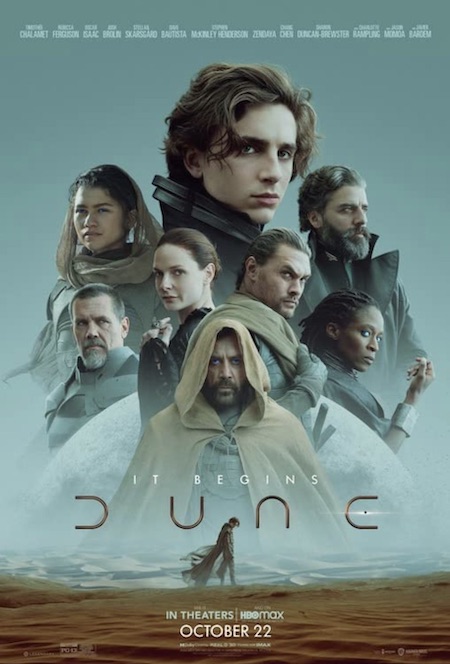

Dune: Part One (Denis Villeneuve, 2021) Timothée Chalamet
You might like this if you're into scifi, and particularly if you're a Frank Herbert fan. I couldn't detect anything even mildly engaging about it. The lead actor's name maybe. ... Huge waste of money, imo.
IMDb page.
Wikipedia page. Excerpt:
Rotten Tomatoes' critical consensus reads, "Dune occasionally struggles with its unwieldy source material, but those issues are largely overshadowed by the scope and ambition of this visually thrilling adaptation." Metacritic, which uses a weighted average, assigned the film a score of 74 out of 100 based on 67 critics, indicating "generally favorable reviews". Audiences polled by CinemaScore gave the film an average grade of "A–" on an A+ to F scale, while those at PostTrak gave it an 84% positive score (with an average rating of 4.5 out of 5 stars) and 66% saying they would definitely recommend it.
Following its premiere at the Venice Film Festival, early reception was generally positive but did not resonate with some critics. These early reviews praised the film for its scope and ambition, while others found it boring. Summarizing early reviews, Stephen M. Colbert of Screen Rant noted that its complex story and Villeneuve's directorial style were bound to have selective appeal, and that this is reflected in negative reviews thus far.
After its wider release, the film drew praise for its writing and sense of scale, while others criticized the film for being drawn out and for only covering half of the novel. Ben Travis of Empire magazine gave the film five out of five stars and stated, "An absorbing, awe-inspiringly huge adaptation of (half of) Frank Herbert's novel that will wow existing acolytes, and get newcomers hooked on its Spice-fuelled visions. If Part Two never happens, it'll be a travesty." Robbie Collin of The Daily Telegraph also gave the film a five-star rating, calling it "majestic, unsettling and enveloping". Xan Brooks of The Guardian referred to the film in his five-star review as "dense, moody and quite often sublime – the missing link bridging the multiplex and the arthouse". In a positive review, Justin Chang of the Los Angeles Times wrote, "Villeneuve draws you into an astonishingly vivid, sometimes plausibly unnerving vision of the future." Leah Greenblatt of Entertainment Weekly, who graded the film a B, wrote that Dune "is exactly the kind of lush, lofty filmmaking wide screens were made for; a sensory experience so opulent and overwhelming it begs to be seen big, or not at all" and added, "The sheer awesomeness of Villeneuve's execution ... often obscures the fact that the plot is mostly prologue: a sprawling origin story with no fixed beginning or end."
Other critics commented on issues related to pacing and handling of the source material. Critic Owen Gleiberman of Variety wrote: "It's an act of world-building that runs out of storytelling steam ... Dune is out to wow us, and sometimes succeeds, but it also wants to get under your skin like a hypnotically toxic mosquito ... as the movie begins to run out of tricks, it turns woozy and amorphous." Kevin Maher of The Times gave two out of five stars, stating that while "every frame ... is spectacular", "Dune is also kind of boring". Reviewing the film for TheWrap, Steve Pond called the film "both dazzling and frustrating, often spectacular and often slow" and said, "This version of Dune sometimes feels as if it aims to impress you more than entertain you; it's grim on a staggering level, ditching most of the fun of sci-fi yarns in favor of a worldview that feels more like Villeneuve's Sicario or Prisoners than his Arrival."
Some reviewers criticized the film for pulling back from the Arabic and Islamic influences that Herbert had used within the novel but still appropriating these elements, as well as the lack of casting of Middle Eastern or North African actors. Spaihts stated that they had to pull back on their use of Arabic culture embedded in the novel for the film; "The Arab world was much more exotic in the 1960s than it is today. Today the Arab world is with us, they're our fellow Americans, they're everywhere … If you were to build a kind of Arab future on Arrakis in a novel starting today, you would need to invent more and borrow less." Despite this shift, the film was still found by critics to be heavily influenced by Middle Eastern culture and to be troubled by its lack of MENA casting. Serena Rasoul, the founder of the Muslim American Casting, called the lack of MENA actors an "erasure", and "You don't cast MENA or Muslim actors, yet you profit off their culture. That's where it's painful for us as creatives. ... It means that we are not good enough to be part of the film." The resulting film was seen as more orientalist as a result. Additionally, while the original novel was considered by some to have elements of the white savior narrative, the lack of MENA representation in addition to the actors of African descent in roles of characters that were killed off to protect Paul and Jessica were seen to propagate this white savior narrative further within Villeneuve's film, according to Ali Karjoo-Ravary, an assistant professor in Islamic studies of Bucknell University. When asked about the white savior narrative, Villeneuve stated what his intent with the film was. "It's a critique of that. It's not a celebration of a savior. It's a criticism of the idea of a savior, of someone that will come and tell another population how to be, what to believe. It's not a condemnation, but a criticism. So that's the way I feel it's relevant, and that can be seen as contemporary."
Garry Gillard | reviews | New: 27 December, 2021 | Now: 8 September, 2022